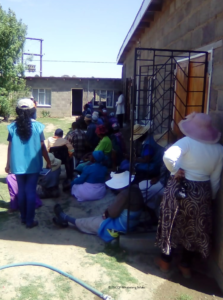Lesotho bridging the gap for better nutrition capacity
* Story originally published by the UN Network for the SUN Movement Lesotho is making great improvements in child nutrition outcomes. Between 2004 – 2014, stunting among children under 5 years old has steadily decreased. Despite this, stunting remains high at 33.2 per cent, micronutrient…
* Story originally published by the UN Network for the SUN Movement
 Lesotho is making great improvements in child nutrition outcomes. Between 2004 – 2014, stunting among children under 5 years old has steadily decreased. Despite this, stunting remains high at 33.2 per cent, micronutrient deficiencies are widespread, and childhood overweight is estimated at 7.4 per cent (REACH Multisectoral Nutrition Overview, 2017). As part of efforts to improve the country’s nutrition situation, the Government of Lesotho commissioned a multi-sectoral nutrition governance capacity assessment.
Lesotho is making great improvements in child nutrition outcomes. Between 2004 – 2014, stunting among children under 5 years old has steadily decreased. Despite this, stunting remains high at 33.2 per cent, micronutrient deficiencies are widespread, and childhood overweight is estimated at 7.4 per cent (REACH Multisectoral Nutrition Overview, 2017). As part of efforts to improve the country’s nutrition situation, the Government of Lesotho commissioned a multi-sectoral nutrition governance capacity assessment.
The assessment, which ran from August 2017 to March 2018, used the UN Network’s Nutrition Capacity Assessment tool. It was carried out by the Network’s intensive multi-sectoral technical assistance service – REACH – thanks to generous funding from Irish Aid. It specifically examined the capacity of the Lesotho Food and Nutrition Coordinating Office (FNCO), Ministries of Health, Agriculture, Education and Training, along with other stakeholders (including civil society and the media) engaged in multi-sectoral and multi-stakeholder nutrition processes. The UN Network’s REACH Facilitator helped the Government link these processes and employ a participatory process for developing these frameworks, prompting wider stakeholder engagement.
The assessment examined the institutional architecture of the FNCO and how it engages with key ministries, along with their capacity and skills, and the broader enabling environment. It revealed that while progress has been made on building multi-stakeholder platforms and aligning nutrition-relevant programmes, increased focus is required for maintaining strong coordination mechanisms, mainstreaming nutrition into governmental policies and frameworks, and undertaking evidence-based decision-making on nutrition. To achieve this, it highlighted the importance of scaling up cross-sectoral nutrition information systems, increasing nutrition specific personnel, and strengthening the role of the FNCO. These results and recommendations have now been integrated into the National Food and Nutrition Strategy Development Plan (2018 – 2022).
This capacity assessment is expected to lead to optimized learning opportunities and increased operational efficiencies. The next steps are to strengthen FNCO’s coordination capacity (both technical and functional skills) through developing a capacity development plan. Actors are optimistic that this will attract additional investment to support nutrition scale-up and improved well-being of the Basotho, particularly amongst vulnerable and marginalized groups.
Related documents
Lesotho Multi-sectoral nutrition governance capacity assessment report – English